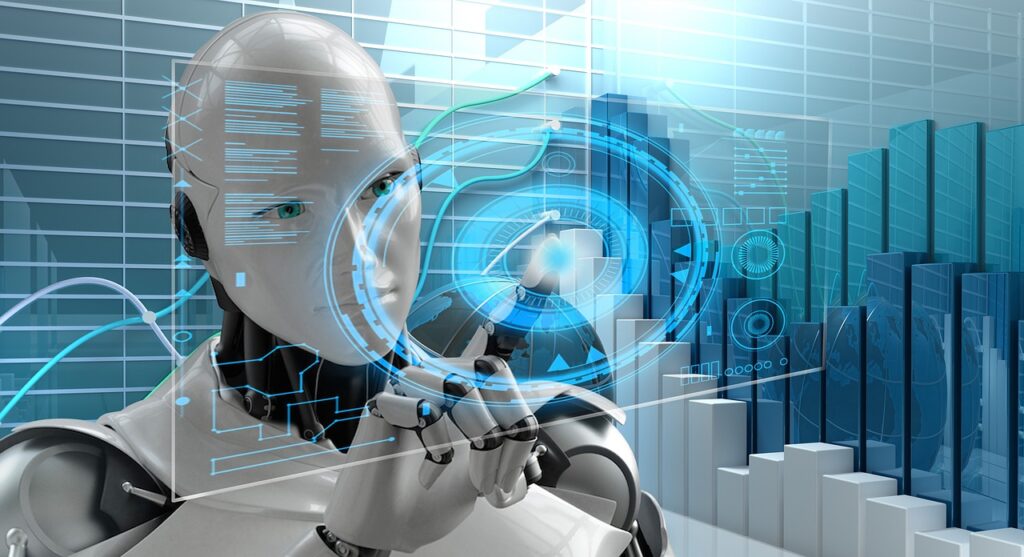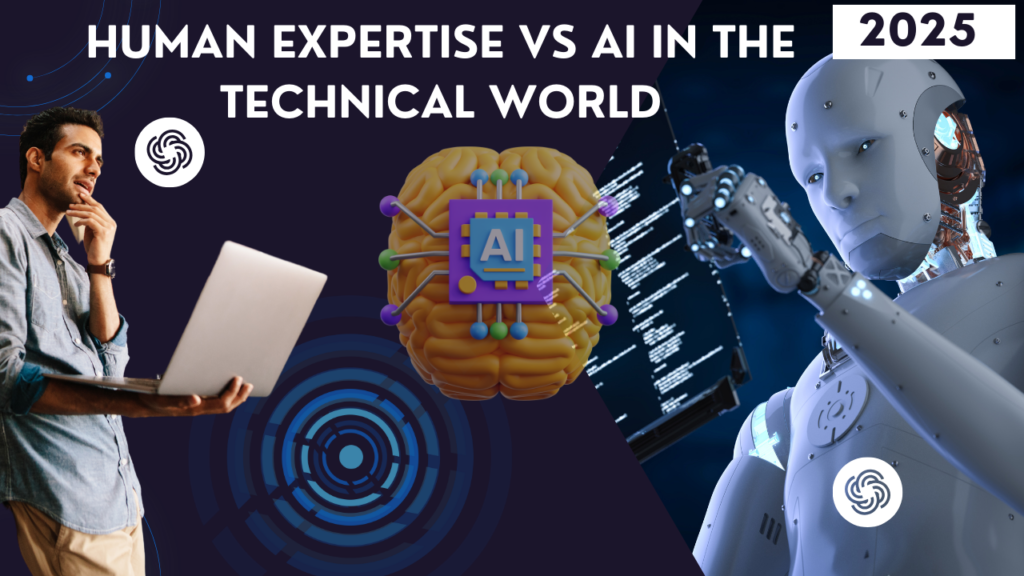In today’s rapidly evolving world, technology has become a vital part of our daily lives. Like Human Expertise vs Artificial Intelligence From smartphones to automated systems, technology is reshaping the way we live and work. One of the most significant advancements in recent years has been the rise of artificial intelligence (AI). As AI systems become more sophisticated, they are starting to challenge the traditional role of human expertise, especially in technical fields. But how does human expertise compare to AI in the technical world? Can AI completely replace humans, or do both have unique strengths that can complement each other?
This article will explore the differences between human expertise and AI in the technical world, highlighting their strengths, limitations, and how they can work together for better results.
1. Understanding Human Expertise
Human expertise refers to the deep knowledge, skills, and experience that people develop over time. Experts in technical fields, such as engineers, scientists, and IT professionals, gain their expertise through education, training, and years of hands-on experience. They use their knowledge to solve complex problems, make decisions, and create innovative solutions.
- Problem-Solving Skills: Human experts are known for their ability to think creatively and solve problems. They can understand the context of a situation, analyze various factors, and come up with solutions that might not be obvious at first.
- Adaptability: Human experts can adapt to new situations. They can learn from their mistakes, change their approach when necessary, and deal with unexpected challenges. This flexibility is essential in technical fields where situations can change quickly.
- Ethical and Moral Judgments: One important aspect of human expertise is the ability to make decisions based on ethics and morals. Experts often consider the impact of their decisions on society, the environment, and individuals, ensuring that their solutions are not only effective but also responsible.
However, human expertise also has its limitations. People can get tired, make mistakes, or be influenced by emotions, which can sometimes lead to errors in judgment. Additionally, acquiring expertise takes time, and not everyone has the same level of knowledge or experience.
2. Artificial Intelligence
Artificial intelligence, or AI, is a branch of computer science that aims to create machines and systems that can perform tasks that normally require human intelligence. Human Expertise VS Artificial Intelligence These tasks include problem-solving, learning, decision-making, and understanding language. AI systems use data and algorithms to mimic human thought processes and can perform tasks at high speeds and with great accuracy.

- Speed and Efficiency: AI can process vast amounts of data quickly and accurately. In tasks that require analyzing large sets of data or performing repetitive calculations, AI can outperform humans by a significant margin. For example, AI algorithms can analyze millions of medical images in seconds, identifying patterns that might be missed by human doctors.
- Consistency: Unlike humans, AI does not get tired or make mistakes due to fatigue. It can work 24/7 without losing accuracy or efficiency, making it ideal for tasks that require consistent, high-quality performance.
- Automation of Repetitive Tasks: AI is excellent at automating repetitive tasks. In industries like manufacturing, AI-powered robots can assemble products quickly and accurately, freeing up human workers for more complex tasks.
While AI has many strengths, it also has limitations. AI lacks creativity and intuition, which are qualities that human experts often rely on. AI can only perform tasks based on the data it has been trained on, meaning it may struggle with tasks that involve uncertainty or require thinking outside the box. Additionally, AI systems are not capable of understanding ethical or moral considerations, which is a key area where human expertise is still essential.
3. How Human Expertise and AI Complement Each Other
Rather than viewing AI as a replacement for human expertise, it is more accurate to see AI as a tool that can complement human abilities. Human Expertise VS Artificial Intelligence In many technical fields, AI and human experts can work together to achieve better results than either could achieve alone.
- AI Assisting Human Experts: AI can help human experts by processing large amounts of data quickly and providing insights that humans might not notice. For example, in medical diagnostics, AI can analyze patient data and suggest potential diagnoses, but the final decision is made by a human doctor who considers the patient’s overall health and other factors.
- Automation of Routine Tasks: In fields like software development, AI can automate routine tasks such as writing code, testing software, and debugging, allowing human developers to focus on more creative and complex aspects of the project.
- Decision Support: AI can assist human experts by providing decision support. In fields like finance, AI algorithms can analyze market trends and suggest investment strategies, but human financial advisors are needed to make final decisions based on a broader understanding of the client’s needs and goals.
4. Limitations of AI and the Need for Human Expertise
While AI has shown remarkable progress, there are certain tasks where human expertise remains essential. These are areas where AI’s limitations become apparent, and human judgment, creativity, and experience are needed.
- Creativity and Innovation: AI can analyze data and recognize patterns, but it cannot create something new or innovative. Human experts are needed to come up with new ideas, design new products, and develop innovative solutions to complex problems.
- Dealing with Uncertainty: In situations where there is uncertainty or incomplete data, human experts are better at making decisions. AI relies on existing data to make predictions, so if the data is incomplete or inaccurate, the AI’s performance may suffer. Human experts, on the other hand, can use their intuition and experience to make informed decisions even when the data is unclear.
- Ethical Decision-Making: AI does not have the ability to understand ethics or morality. In fields like healthcare, law, or social services, human experts are needed to make decisions that consider the ethical implications of their actions. For example, while an AI might suggest the most cost-effective treatment for a patient, a human doctor is needed to consider the patient’s overall well-being and preferences.
5. Real-World Examples of Human Expertise and AI Working Together
There are many real-world examples of AI and human expertise working together to achieve remarkable results. Here are a few examples:
- Healthcare: In the healthcare industry, AI is being used to assist doctors in diagnosing diseases, analyzing medical images, and developing personalized treatment plans. However, human doctors are still needed to interpret the AI’s results, consider the patient’s history, and make final decisions about treatment.
- Manufacturing: In manufacturing, AI-powered robots are used to automate repetitive tasks such as assembling products or managing inventory. Human engineers, however, are needed to design the manufacturing process, maintain the robots, and solve any problems that arise.
- Finance: In the finance industry, AI algorithms are used to analyze market trends and make investment recommendations. However, human financial advisors are still needed to provide personalized advice based on the client’s financial goals, risk tolerance, and personal preferences.
6. The Future of Human Expertise and AI in the Technical World
As AI continues to evolve, its role in the technical world will likely grow. However, this does not mean that human expertise will become obsolete. Instead, the future will likely involve even more collaboration between AI and human experts. AI will continue to take over routine and data-intensive tasks, while humans will focus on creative problem-solving, innovation, and ethical decision-making.
It is important for individuals in technical fields to embrace AI as a tool that can enhance their work rather than viewing it as a competitor. By learning how to use AI effectively, human experts can improve their efficiency, make better decisions, and stay competitive in an increasingly automated world.
Conclusion
In conclusion, both human expertise and AI have unique strengths and limitations in the technical world. While AI excels at processing data, automating tasks, and providing decision support, it lacks the creativity, intuition, and ethical judgment that human experts bring to the table. Rather than replacing humans, AI should be seen as a powerful tool that can complement and enhance human abilities. By working together, AI and human experts can achieve better results than either could alone, leading to a future where technology and human expertise are more closely integrated than ever before.
